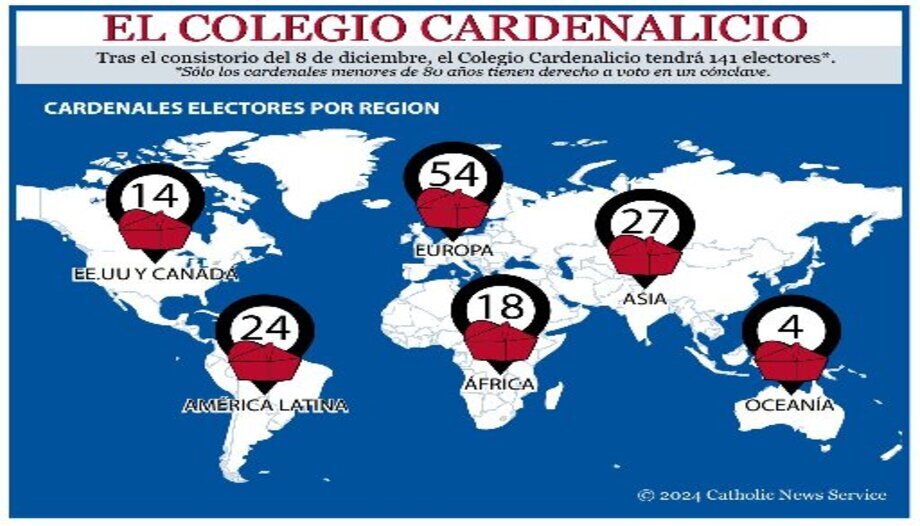"This Pope's trip to Asian countries helps us understand the importance of Asia. And this time there are three new cardinals Asia -Indonesia, Japan and the Philippines-. This means that the mission is moving from Europe to other areas of the global south. The center of the Church is no longer in Europe, but in the global south," said Archbishop Tarcisio Isao Kikuchi of Tokyo (Japan), newly appointed Cardinal, at a press conference today to report on the work of the Second Session of the Synod being held in Rome.
This is the significance of the appointment, the Japanese archbishop responded to questions from journalists. "I know some of the cardinals, because I have worked at Caritas Internationalis, and I already knew some of the cardinals."
"The Synod needs to hear from cardinals from different regions."
"We can rejoice in this openness of the spirit of this Pope who wanted to associate all parts of the universal Church," said in the same vein the Archbishop of Abidjan (Ivory Coast), Mgr Ignace Bessi, another of the next cardinals.
"The fact of appointing cardinals from different countries, from different continents, is a sign that the Pope is opening the Church, and the Church needs to listen. It is the key word of this Synod, but in order to listen there need to be people who speak, cardinals who come from different regions of the world, who can express themselves, and the Holy Father can listen to their voice, and they will listen to the voice of the Pope," added Monsignor Bessi.
"This is the Catholic nature of the Church, a universal Church. All parts, all regions, have something to say. This Synod is a model, the model of the Church in which everyone is heard. The important thing is that we have all been baptized in Christ and all have the same dignity."
"An extraordinary universality"
"When we say Catholic, we do not refer only to a religious creed, but we want to indicate an openness, a generosity proper to God, who is capable of dialoguing with all differences, cultures, peoples". "And surely this richness, or this diversity, of the College of Cardinals is an expression of this way of being Catholic. It is beautiful this concern of the Holy Father towards different cultures," said the Monsignor Jaime SplengerO.F.M., archbishop of Porto Alegre (Brazil), and president of the president of the National Conference of Bishops of Brazil (CNBB) and of the Latin American and Caribbean Episcopal Council (CELAM), also named cardinal.
"The cardinal of Mongolia has 1,500 faithful, I have 4 million faithful in my diocese, but this is not a criterion. The criterion is another. And if we keep in mind the history of the Church in the last hundred years, how many cardinals were there at the beginning of the 20th century, and where did they come from?
"We are different from one another, but there is something that unites us, and it is precisely here where the beauty and greatness of the College itself lie," added the president of CELAM.
Nine cardinals out of the next 21 at the Synod
Yesterday, at the usual press conference to report on the work of the Synod, Cardinal Grech emphasized the participation in the Synod of 9 of the 21 new cardinals announced yesterday by the Pope: Luis Gerardo Cabrera Herrera, Tarcisio Isao Kikuchi, Pablo Virgilio Siongco David, Ladislav Nemet, Jaime Spengler, Ignace Bessi Dogbo, Dominique Mathieu, Roberto Repole, Timothy Peter Joseph Radcliffe.
In today's appearance, it was reported that the circles discussed Christian initiation, synodal conversion, the deepening of the diaconate, fraternal relationships, and the concept of synodality, among other topics. The Archbishop of Tokyo said in the conference that it is necessary to "lay the foundations of synodality, what synodality means".
Drafters of the Final Document
Also yesterday, Sheila Pires, secretary of the Information Commission, pointed out that "the assembly plans to elect the members of the Commission for the drafting of the final Document".
In fact, as reported by Paolo Ruffini, prefect of the Dicastery for Communication and president of the Commission for Information, the four ex officio members are Cardinals Grech and Hollerich, and special secretaries Battochio and Costa.
Of the remaining 10 with supervisory mission, three have been appointed by the Pope (Prof. Bonfrate, Gregorian University; Cardinal Ferrao, Archbishop of Goa and Damao (India), and Sr. Leticia Salazar, San Bernardino, USA. And seven by geographical zones: Card. Ambongo, of Kinshasa; Card. Rueda, Bogotá; Catherine Clifford (U. S. Paul, Ottawa); Fr. Davedassan, Malaysia; Card. Aveline, Marseille (France); Bishop Khairallah of Lebanon; and Bishop McKinlay of Oceania.
Pope's Letter to Catholics in the Middle East
The session recalled the dispatch of a Letter of Pope Francis to the Catholics of the Middle East. And at the opening of the work, reported Paolo Ruffini, Cardinal Grech recalled that it is "a day of prayer and fasting", by the will of the Pope, in the spiritual atmosphere of the Rosary for peace prayed yesterday in Santa Maria Maggiore. "Prayer, fasting, but also charity," Ruffini pointed out, recalling that Cardinal Konrad Krajewski had announced in the Aula a collection of funds destined in particular for the parish of Gaza and the parish priest, Father Gabriel Romanelli.








